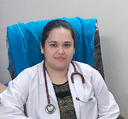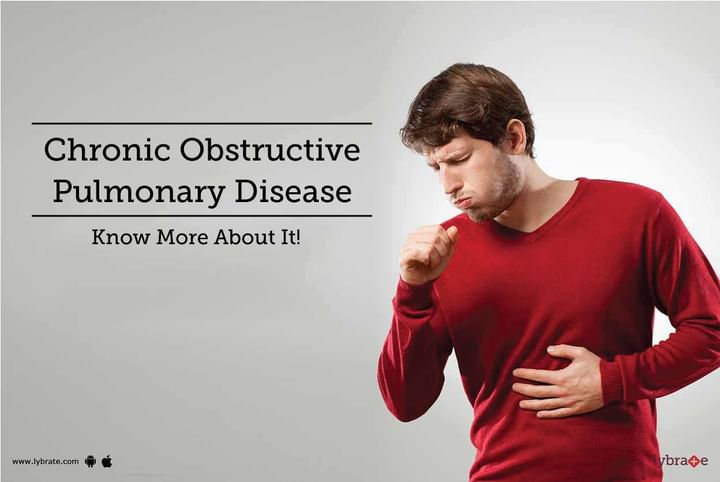Chronic Obstructive Pulmonary Disease - Know More About It!
Chronic obstructive pulmonary disease is a long-term condition of the lungs where the flow of air to the lungs is restricted (obstructed). Symptoms include cough and breathlessness. The condition is most often caused by smoking and the most important treatment is to stop smoking. Inhalers are commonly used to ease symptoms. Other treatments such as steroids, antibiotics, oxygen, and mucus-thinning (mucolytic) medicines are sometimes prescribed in more severe cases, or during a flare-up (exacerbation) of symptoms.
What causes COPD?
Smoking is by far the biggest risk factor for COPD. The lining of the airways becomes inflamed and damaged by smoking. Cigarette smoking is the biggest risk factor.
Air pollution may cause some cases of COPD, or make the disease worse. Air pollution can be indoor air pollution or outdoor air pollution. Indoor air pollution seems to be involved in more cases of COPD than outdoor air pollution. Indoor air pollution includes fumes from indoor fires or stoves, and dust, fumes or chemicals present in some workplaces. The combined effect of exposure at work to air pollutants and smoking increases the chances of developing COPD.
A small number of people have a hereditary (genetic) risk of COPD due to very rare protein deficiencies that can lead to lung, liver and blood disorders. (The condition is called alpha 1 antitrypsin deficiency. Less than 1 in 100 cases of COPD are due to this.
COPD symptoms-
- Cough is usually the first symptom to develop. It is produced with phlegm (sputum). It tends to come and go at first, and then gradually becomes more persistent (chronic). You may think of your cough as a 'smokers cough' in the early stages of the disease. It is when the breathlessness begins that people often become concerned.
- Breathlessness (shortness of breath) and wheeze may occur only when you exert yourself at first. For example, when you climb the stairs. These symptoms tend to become gradually worse over the years if you continue to smoke. Difficulty with breathing may eventually become quite distressing.
- Sputum - the damaged airways make a lot more mucus than normal. This forms sputum. You tend to cough up a lot of sputum each day.
- Chest infections are more common if you have COPD. A sudden worsening of symptoms (such as when you have an infection) is called an exacerbation. Wheezing with cough and breathlessness may become worse than usual if you have a chest infection and you may cough more sputum. Sputum usually turns yellow or green during a chest infection. Chest infections can be caused by germs called bacteria or viruses.
Other symptoms of COPD can be vaguer. Examples are weight loss, tiredness and ankle swelling.
What is the difference between COPD and asthma?
- COPD and asthma cause similar symptoms - in particular difficulty breathing (breathlessness). However, they are completely different diseases. Briefly:
- In COPD there is permanent damage to the airways. The narrowed airways are fixed, and so symptoms are persistent (chronic). Treatment to open up the airways is therefore limited.
- In asthma, there is inflammation in the airways which makes the muscles in the airways narrow (constrict). This is temporary so the narrowing comes and goes. So, the symptoms tend to come and go, and vary in severity from time to time. Treatment to reduce inflammation and to open up the airways usually works well.
- COPD is more likely than asthma to cause an ongoing cough with phlegm (sputum).
- Waking at night with breathlessness or wheeze is common in asthma and uncommon in COPD.
- COPD is rare before the age of 35, whilst asthma is common in under-35s.
- There is more likely to be a history of asthma, allergies, eczema and hay fever (so-called atopy) in people with asthma.
Do I need any tests?
The most common test used in helping to diagnose the condition is called spirometry. This is a breathing test. You will be asked to breathe or blow into a small machine called a spirometer which will measure how well your lungs are working. This test can help make a diagnosis of COPD.
- A chest X-Ray show signs of COPD and can be used to help exclude other serious conditions (including lung cancer). Occasionally, a special CT scan of the chest - high-resolution CT - is needed. A blood test to make sure you are not anemic is often helpful.
- A pulse oximeter is a device which can be clipped on to your finger. It measures your heart rate (pulse) and the amount of oxygen in your circulation (oxygen saturation). Lower levels than normal tend to be found in people who have COPD, especially if you have a flare-up (exacerbation) of your symptoms.
COPD treatment-
- Smoking cessation is the most important step towards treatment.
- Inhalers
The main treatments are medications given in devices called inhalers. The medicine within the inhaler is in a powdered form which you breathe in (inhale). The medicines in standard inhalers reach the lungs better if used with a spacer device. Inhalers include one, two or even three types of medicines. They may include:
- A bronchodilator agent - this is a medicine which opens up (dilates) the airways. Some work quickly but don't last very long; others are longer-acting.
- A steroid - these reduce the inflammation in the airway, thereby reducing the swelling. This, in turn, adds to the space available for air to pass.
- A medicine which helps to dry up the secretions produced by the airways.
- Home oxygen
This may help some people with severe symptoms or end-stage COPD. It does not help in all cases. Unfortunately, just because you feel breathless with COPD it does not mean that oxygen will help you. Great care has to be taken with oxygen therapy. Too much oxygen can actually be harmful if you have COPD.
Regular follow up in OPD is an essential part of treatment success.



+1.svg)
